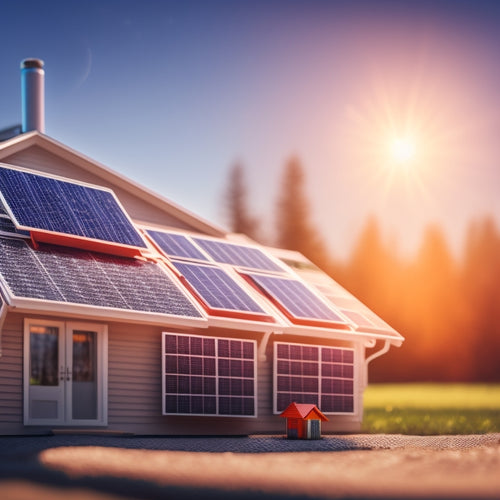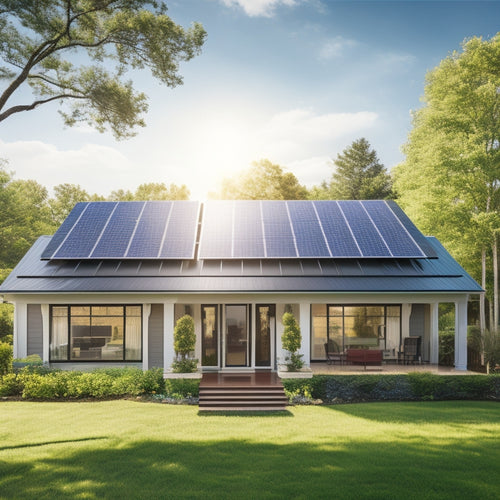
What Are the Best Solar Power Storage Systems?
Share
You're looking for the best solar power storage systems to achieve energy independence and harness renewable energy. For off-grid systems, consider brands like SimpliPhi Power, Schneider Electric, and Rolls-Surrette, which offer advanced system design and remote monitoring capabilities. Deep cycle batteries from brands like East Penn Deka, Crown Battery, and FullRiver are built for charge and discharge cycles. Lithium-ion battery solutions offer high energy density and long cycle life. Top-rated solar power inverters like Schneider Electric Conext and OutBack VFX2800 convert DC to AC power efficiently. To find the perfect solution for your needs, explore these options and discover how they can optimize your solar power storage system.
Key Takeaways
• Off-grid solar storage systems from brands like SimpliPhi Power and Schneider Electric offer advanced system design and remote monitoring capabilities.
• Deep cycle battery options from East Penn Deka and Crown Battery provide reliable power storage with proper maintenance and cycle counting.
• Lithium-ion battery solutions offer high energy density, long cycle life, and low self-discharge rates, making them a popular choice for solar power storage.
• Look for high-efficiency solar power inverters like Schneider Electric Conext and OutBack VFX2800, with built-in chargers and advanced monitoring capabilities.
• AGM and gel batteries provide a reliable alternative to lithium-ion batteries, with benefits including improved safety features and low maintenance requirements.
Top Off-Grid Solar Storage Systems
When venturing off the grid, you'll need a reliable solar storage system to bank on, and high-quality off-grid solar storage systems like SimpliPhi Power, Schneider Electric, and Rolls-Surrette offer the perfect blend of performance, durability, and flexibility.
These systems are designed to provide energy independence, allowing you to harness renewable energy from the sun and store it for later use. With advanced system design, you can optimize your energy storage to meet your specific needs, whether it's backup power for critical loads or island mode for autonomous operation.
Remote monitoring capabilities also enable you to keep tabs on your system's performance and make adjustments as needed. By investing in a superior off-grid solar storage system, you'll be able to tap into the full potential of renewable energy and enjoy the freedom that comes with energy independence.
With the right system, you can rest assured that you'll have a reliable source of power, even when the grid is unavailable.
Deep Cycle Battery Options
As you explore deep cycle battery options for your off-grid solar power storage system, you'll find that manufacturers like East Penn Deka, Crown Battery, and FullRiver offer a range of reliable and efficient deep cycle batteries designed to handle the demands of renewable energy systems. These batteries are built to withstand the repeated charge and discharge cycles required by solar power systems, making them an essential component of your off-grid setup.
When selecting a deep cycle battery, consider the importance of Battery Maintenance. Regular maintenance is critical to extend the lifespan of your batteries and ensure peak performance. This includes monitoring electrolyte levels, checking for corrosion, and performing equalization charges.
Additionally, Cycle Counting is essential to track the battery's state of health and predict its remaining lifespan. Look for batteries with built-in cycle counters or consider investing in a battery monitoring system to streamline maintenance tasks.
Best Solar Power Inverters
With your deep cycle batteries in place, you'll need a high-efficiency inverter to convert the DC power they store into AC power for your off-grid solar power system. This is where the best solar power inverters come in. These devices are essential for efficiently converting DC power into AC power, which is what your home's appliances use. Look for an inverter with a high efficiency rating, typically above 95%, to minimize energy loss.
When selecting an inverter, consider one with a built-in charger, which can recharge your batteries when the grid is available. This is particularly useful for smart homes that incorporate renewable energy sources.
Some top-rated solar power inverters include the Schneider Electric Conext, the OutBack VFX2800, and the Magnum Energy MS2812. These inverters are designed for off-grid systems, providing a reliable and efficient power supply. They also feature advanced monitoring capabilities, allowing you to track your energy production and consumption in real-time.
Lithium-Ion Battery Solutions
When exploring lithium-ion battery solutions for your solar power storage system, you'll want to take into account the key advantages they offer.
You'll benefit from high energy density, which allows for more efficient storage in a smaller footprint.
Additionally, lithium-ion batteries boast long cycle life and low self-discharge, ensuring reliable performance over time.
High Energy Density
Lithium-ion batteries, renowned for their high energy density, have emerged as a preferred choice for solar power storage systems, offering exceptional performance and reliability. As you explore the world of solar power storage, you'll find that lithium-ion batteries stand out for their ability to pack a lot of energy into a small space. This is thanks to innovative materials and design advancements that have improved energy efficiency.
Some key benefits of lithium-ion batteries with high energy density include:
-
Improved Energy Efficiency: High energy density means more power can be stored in a smaller space, reducing the overall size and weight of the system.
-
Increased Capacity: With more energy stored per unit of weight and volume, you can enjoy longer periods of backup power during outages.
-
Enhanced Performance: High energy density batteries are designed to provide consistent and reliable performance, even in extreme temperatures.
Long Cycle Life
You can count on lithium-ion battery solutions to provide a long cycle life, meaning they can be charged and discharged many times without significant capacity loss, making them a cost-effective option for solar power storage systems.
This extended lifespan is attributed to the battery's ability to withstand numerous charge and discharge cycles without compromising its performance. In fact, lithium-ion batteries can endure up to 5,000 cycles or more, depending on the manufacturer and quality of the battery.
This is made possible by the battery's durable design and robust internal components, which guarantee consistent performance over time. To evaluate the battery's durability, manufacturers conduct rigorous cycle testing, which involves charging and discharging the battery repeatedly to simulate real-world usage.
The results of these tests demonstrate the battery's ability to retain its capacity and maintain its performance over an extended period. With a long cycle life, you can enjoy a reliable and efficient solar power storage system that requires minimal maintenance and replacement.
Low Self-Discharge
As you consider the reliability of lithium-ion battery solutions, their low self-discharge rate becomes a significant advantage, allowing them to retain a high state of charge even when not in use. This means you don't have to worry about your battery draining quickly, making it an ideal choice for solar power storage systems.
To maximize the shelf life of your lithium-ion batteries, follow these maintenance tips:
-
Store them in a cool, dry place away from direct sunlight
-
Avoid deep discharging, and try to keep the state of charge between 20% and 80%
-
Monitor and maintain the battery's state of health through regular checks and updates
Lead-Acid Battery Alternatives
When considering lead-acid battery alternatives, you'll want to explore options that offer improved performance and lifespan.
Lithium-ion batteries, for instance, boast higher energy density and longer cycle life, making them an attractive alternative.
You'll also want to look into deep cycle options, which are designed to handle the demands of off-grid solar power systems.
Lithium-Ion Advantages
Lithium-ion batteries offer a considerably longer lifespan and deeper discharge capabilities compared to lead-acid batteries, making them a more reliable and efficient alternative for solar power storage systems. When you opt for lithium-ion batteries, you can expect to reap several benefits.
Here are some advantages you can look forward to:
-
Cost-effectiveness: Lithium-ion batteries have a longer lifespan, which means you won't need to replace them as frequently, saving you money in the long run.
-
Environmental benefits: Lithium-ion batteries are more eco-friendly than lead-acid batteries, as they contain fewer toxic chemicals and are recyclable.
-
Increased efficiency: Lithium-ion batteries have a higher depth of discharge, allowing you to use more of the battery's capacity, making them a more efficient option for your solar power storage system.
Deep Cycle Options
You'll find that deep cycle batteries, particularly those featuring absorbed glass mat (AGM) or gel technology, offer a reliable alternative to lithium-ion batteries for solar power storage systems. These batteries are designed to provide a steady flow of energy over a longer period, making them well-suited for off-grid solar systems.
One of the key benefits of deep cycle batteries is their low maintenance requirements. They can be charged and discharged repeatedly without significant degradation, guaranteeing consistent cycle performance.
AGM batteries, in particular, are known for their reliability and durability, with a lifespan of up to 10 years. They also offer improved safety features, such as reduced risk of acid spills and lower emissions.
Gel batteries, on the other hand, offer enhanced deep cycle capabilities and are ideal for applications requiring a high number of charge-discharge cycles.
When it comes to battery maintenance, deep cycle batteries require regular monitoring of electrolyte levels and charging voltage to ensure peak performance. By doing so, you can maximize their lifespan and guarantee reliable power storage for your solar power system.
Grid-Tie Solar Power Systems
Grid-tie solar power systems, which comprise a solar panel array, an inverter, and a grid connection, enable homeowners and businesses to generate their own electricity and feed any excess back into the grid. This setup allows you to offset your energy consumption and reduce your reliance on the grid.
With grid-tie systems, you can take advantage of Grid Parity, where the cost of generating solar energy is equal to or lower than traditional grid electricity.
Here are some benefits of grid-tie solar power systems:
-
Net Metering: You can sell excess energy back to the grid and receive a credit on your utility bill.
-
Reduced energy bills: By generating your own electricity, you'll reduce your energy consumption from the grid, leading to lower bills.
-
Increased property value: Installing a grid-tie system can increase your property value and appeal to potential buyers if you decide to sell.
Frequently Asked Questions
Can I Use My Existing Battery Bank With a New Solar Panel System?
As you commence on a new solar journey, you ponder if your existing battery bank can harmonize with your shiny new panel system. Compatibility is key; guarantee seamless system integration by checking voltage, capacity, and chemistry to avoid a mismatch that could drain your energy dreams.
How Often Should I Maintain and Inspect My Solar Power Storage System?
You should conduct system checks every 3-6 months to guarantee peak performance, extending your battery life; inspecting electrical connections, battery water levels, and charging/discharging cycles helps prevent issues and optimizes energy storage.
Are There Any Government Incentives for Installing Solar Power Storage Systems?
'As you harness the sun's energy, don't overlook the golden opportunities: you're eligible for tax credits, renewable grants, federal rebates, and state incentives, which can greatly offset the cost of your solar power storage system installation.'
Can I Connect Multiple Solar Power Storage Systems Together for More Power?
You can connect multiple solar power storage systems together, leveraging scalability benefits and system integration to increase overall power output, providing a customized solution that meets your unique energy needs.
Will a Solar Power Storage System Still Work During a Blackout or Grid Outage?
Surprisingly, you're not alone in wondering if your solar power storage system will be your knight in shining armor during a blackout. Fortunately, yes, it will work, providing power backup and grid reliability when you need it most.
Related Posts
-

A Beginner's Guide to Navigating the Solar Investment Tax Credit
You're eligible to claim a significant Solar Investment Tax Credit (ITC) of 30% of total installation costs, but mane...
-

Top Camping Water Bottles for Adventure
When you're out adventuring, picking the right camping water bottle is essential for staying hydrated. Look for durab...
-

Home Solar Installation Cost
You're considering installing solar panels on your home, and the upfront cost is likely the biggest hurdle standing i...


